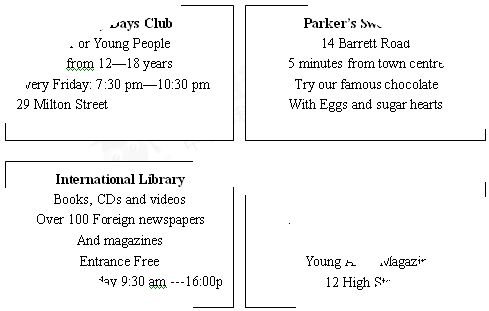
科目: 來(lái)源: 題型:閱讀理解

查看答案和解析>>
科目: 來(lái)源: 題型:閱讀理解
查看答案和解析>>
科目: 來(lái)源: 題型:閱讀理解
 | The 16th Asian Games was held from November 12th to 27th in 2010 in Guangzhou, China. There were 41 events in the Games. China got 199 gold medals and reached the total medals of 416. Guangzhou was the second Chinese city to host the Asian Games. In 1990 Beijing held the 11th Asian Games. |
 | Premier Wen Jiabao went to Shanxi province on April 2nd , 2011. He made a three-day visit to impoverished(窮困的) Luliang. During his visit, he said that farmers’ right(權(quán)利)must be protected and he warned(警告) that no land should ever be taken against a farmer’s will(意愿). |
 | The Beijing-Shanghai High Speed Railway will be put into operation at the end of June, 2011. The journey takes about five hours. The train can reach speeds of up to 380 kilometers an hour. The passenger volume (容量) is expected to reach 160 million a year, marking(標(biāo)志) a great step in China’s Railway development. |
查看答案和解析>>
科目: 來(lái)源: 題型:閱讀理解
查看答案和解析>>
科目: 來(lái)源: 題型:閱讀理解
查看答案和解析>>
科目: 來(lái)源: 題型:閱讀理解
查看答案和解析>>
科目: 來(lái)源: 題型:閱讀理解
查看答案和解析>>
科目: 來(lái)源: 題型:閱讀理解
查看答案和解析>>
科目: 來(lái)源: 題型:閱讀理解
查看答案和解析>>
科目: 來(lái)源: 題型:閱讀理解
Three students are giving their opinions(看法) about what a good friend should be like.
| Cindy | I think a good friend should be honest(誠(chéng)實(shí)的). That’s more important than any other thing. And it is where a real friendship starts. If a friend isn’t honest, he may lose his friends’ trust. |
| Jerry | I think a good friend has to be generous(慷慨的). Here being generous doesn’t mean he has to give his friends his lunch money or his clothes. It means he should share his ideas and feelings with his friends. In fact, his friends can know him better in this way. |
| Mary | In my opinion, a good friend should understand his friends. When there’s something wrong between him and his friends, he must put himself in his friends’ place and think more for his friends. |
查看答案和解析>>
百度致信 - 練習(xí)冊(cè)列表 - 試題列表
湖北省互聯(lián)網(wǎng)違法和不良信息舉報(bào)平臺(tái) | 網(wǎng)上有害信息舉報(bào)專(zhuān)區(qū) | 電信詐騙舉報(bào)專(zhuān)區(qū) | 涉歷史虛無(wú)主義有害信息舉報(bào)專(zhuān)區(qū) | 涉企侵權(quán)舉報(bào)專(zhuān)區(qū)
違法和不良信息舉報(bào)電話(huà):027-86699610 舉報(bào)郵箱:58377363@163.com